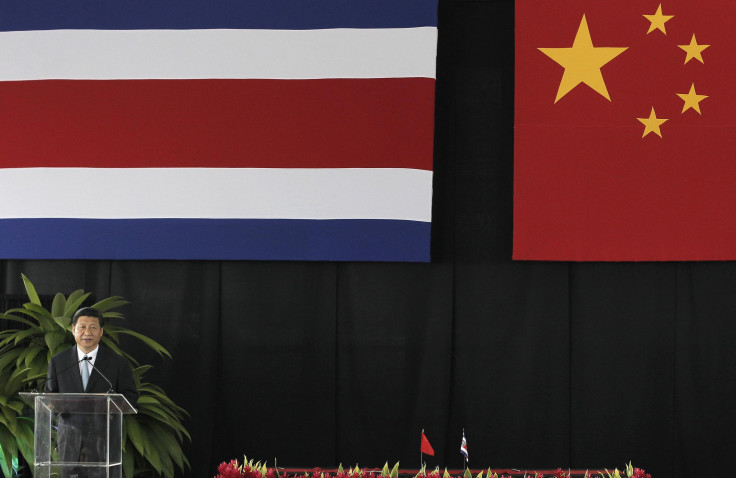What Do China And The US Want From Latin America? Local Media React To Visits From Joe Biden And Xi Jinping

The two most powerful economies in the world are looking to Latin America. U.S. Vice President Joe Biden took a whirlwind trip to Colombia, Trinidad and Tobago, and Brazil last week, while President Xi Jinping of China arrives in Mexico on Tuesday, the last stop on his trip after visiting Trinidad and Costa Rica.
Both visits aimed at improving their countries’ trade ties with the fastest-growing region in the world. Biden had meetings with several regional leaders in both Trinidad and Brazil, and said after his journey that U.S. relations with Latin America will become “deeper and broader.” Xi, for his part, stated that increasing trade between China and the Caribbean will benefit both parties, and that he expected to reach “a new level” in cooperation between the Asian giant and Latin America.
How did Latin America receive these trips? In a region traditionally looked at as a producer more than a business partner -- not too long ago, China was referring to it as “Washington’s backyard”-- this show of unprecedented attention raised many expectations from local media.
Trinidad and Tobago’s biggest newspaper, Newsday, called Xi’s visit a “historic occasion,” since it was the first by a Chinese head of state since diplomatic relations were established in 1974, and termed the trip a “visit from China to a good friend.”
Xi, who was accompanied by his glamorous wife Peng Liyuan, met with leaders of several Caribbean nations, including Antigua and Barbuda, Jamaica, and Barbados. Representatives from South American countries such as Suriname and Guyana were also present at the meeting, in which Xi expressed his interest in signing bilateral agreements with every country.
Trinidad and Tobago’s Prime Minister Kamla Persad-Bissessar told Newsday she is deeply appreciative of Xi’s “commitment to boost relations in the Caribbean,” and announced the opening of Trinidad’s embassy in Beijing. She also accepted an invitation to visit China for the first time, a trip that is set to happen in November of this year.
Xi left Trinidad on Sunday for Costa Rica, where he met on Monday with President Laura Chinchilla. The two countries signed a slew of agreements, including a $400 million loan to build a road that will cross the country and a plan to build an oil refinery.
However, local newspaper La Nación reported that Johnny Araya, the mayor of Costa Rica’s capital San José, expressed doubt about the oil refinery project. The project, which could cost up to $1.3 billion, does not offer real benefits to Costa Rica, said Araya. The mayor also questioned the legality of an enterprise that has been in the cards for six years, since Costa Rica broke diplomatic relations with Taiwan and approached mainland China instead.
Xi arrived in Mexico on Tuesday. This will be the second meeting between Xi and Mexican President Enrique Peña Nieto, who visited China in April.
Biden’s visit to Latin America, on the other hand, was taken more cautiously by the host countries. After Secretary John Kerry’s slip in April, in which he called the region “America’s backyard,” Latin America took the vice president’s interest with a pinch of salt.
Renowned Colombian journalist Andrés Oppenheimer wrote in an Op-Ed for the newspaper El Colombiano that “apparently Kerry’s slip was not an insult after all,” mentioning that if it hadn’t been for the controversy Biden would have never made it to the continent.
Biden attended a meeting with 20 leaders in Trinidad and Tobago, which Persad-Bissessar called “tense” and “brutal,” although according to Bloomberg, she did not elaborate on specifics.
Brazil’s media took a more benevolent view of the vice presidential visit. National newspaper O Globo reported that Biden called Brazil a “responsible nation,” talking about the $900 million debt that the country recently forgave several African countries.
The newspaper emphasized the improvement of the relations between Washington and Brasilia since President Dilma Rousseff took the leadership of the country in 2011. During the previous term, led by President Luis Lula da Silva, the two countries’ interactions had been fewer and colder, in part because of Lula’s warm relations with Iran and Hugo Chávez’s Venezuela, two adversaries of Washington's.
O Globo reported that Rousseff will visit Washington next October, the only invitation extended by Obama to a foreign leader so far this year.
Follow me on Twitter: @PReyMallen
© Copyright IBTimes 2025. All rights reserved.




















